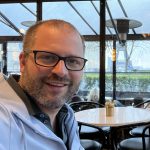Kettingbrief
Verhaallijn 1 01-06-2023
Editie 2 | jaargang 11
What has your career been like so far?
During my master’s degree, I always enjoyed programming and critical thinking to utilize data in problem-solving. This interest led me to pursue a career involving data analysis. I discussed my options with many friends who were already working, and that’s when I discovered Bright Cape.
I felt that it was a great environment with young and ambitious colleagues, where I would have the freedom to decide my development path. Since I was unsure about the exact direction I wanted to take, these aspects were more important to me than the industry or specific job description. Considering these factors, I knew that Bright Cape would be a perfect fit for me.
Once I started working there, I worked on a project involving process mining and realized that this was the field I wanted to pursue. It offers the perfect combination of interacting with businesses and presenting data in an understandable manner, while relying on objective and data-driven reasoning. Since then, I have completed multiple assignments for large corporations and am enthusiastic about continuing to assist companies in enhancing their processes and reducing inefficiencies through process mining.
Which course would you add to the IE curriculum to setup students for success?
Learning how to prepare data for a specific purpose is critical and thus, a course on data preparation would be my recommendation. While we may learn extensively about optimization models and algorithms, we often neglect other aspects such as where the data originates, how to handle file structures that are not Excel, and managing imperfect data. Having an understanding of how to prepare data for a particular purpose is essential for generating valuable insights.
Where do you get the most energy from during and after your work?
The first is showcasing the power of data through process mining. Creating a visual representation of a complex process often leads to a unique moment of recognition, even for individuals who have worked with that process for years. Witnessing their excitement and recognition of the possibilities of this technique to help identify and optimize their processes is truly exciting.
Secondly, the conversations with my colleagues at Bright Cape. Whether it is about fun activities like weekend plans or vacations, or about the latest technique or model developed at one of our customers.
Outside of work, mainly through working out, and of course, seeing friends.
What aspect of business life were you most surprised by after starting your first job?
Experience doesn’t necessarily mean someone knows everything about their job. Even professionals with over two decades of experience learn new things every day and are not afraid to ask for advice when they are uncertain about something. Secondly, networking and building strong relationships with the right people is even more important than I thought for getting things done in large organizations. It’s not always about what you know but who you know and who trusts you. Building connections is essential for success in a corporate environment.
What advice would you give current students?
Enjoy your time at university and don’t worry if you don’t have a concrete career plan. Start your career at a company that offers a good working environment and aligns with your general interests. As you develop in your role, take the opportunity to explore different areas and tasks within the company to find out what you are most passionate about and pursue those interests.
You can change a question, which one would you change and why?
Old question:
What aspect of business life were you most surprised by after starting your first job?
New question:
How does your background in Industrial Engineering help you in your work?
Why:
It’s good to look back and recognize what your education has brought you and which lessons you still apply in your daily work. For me, having the ability to understand a business challenge from a high-level before diving into the details and figuring out how data can support in solving that challenge is the main lesson.







